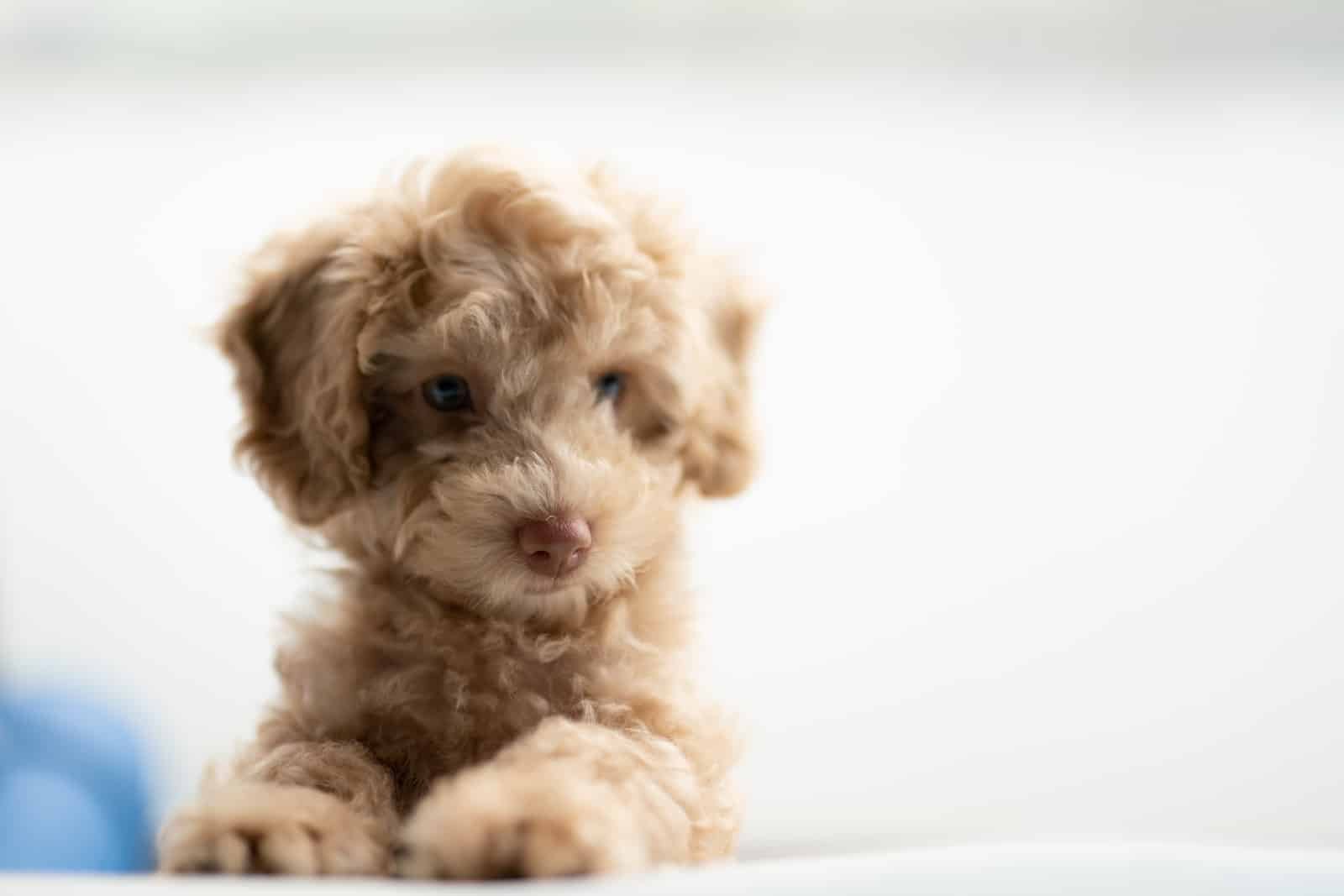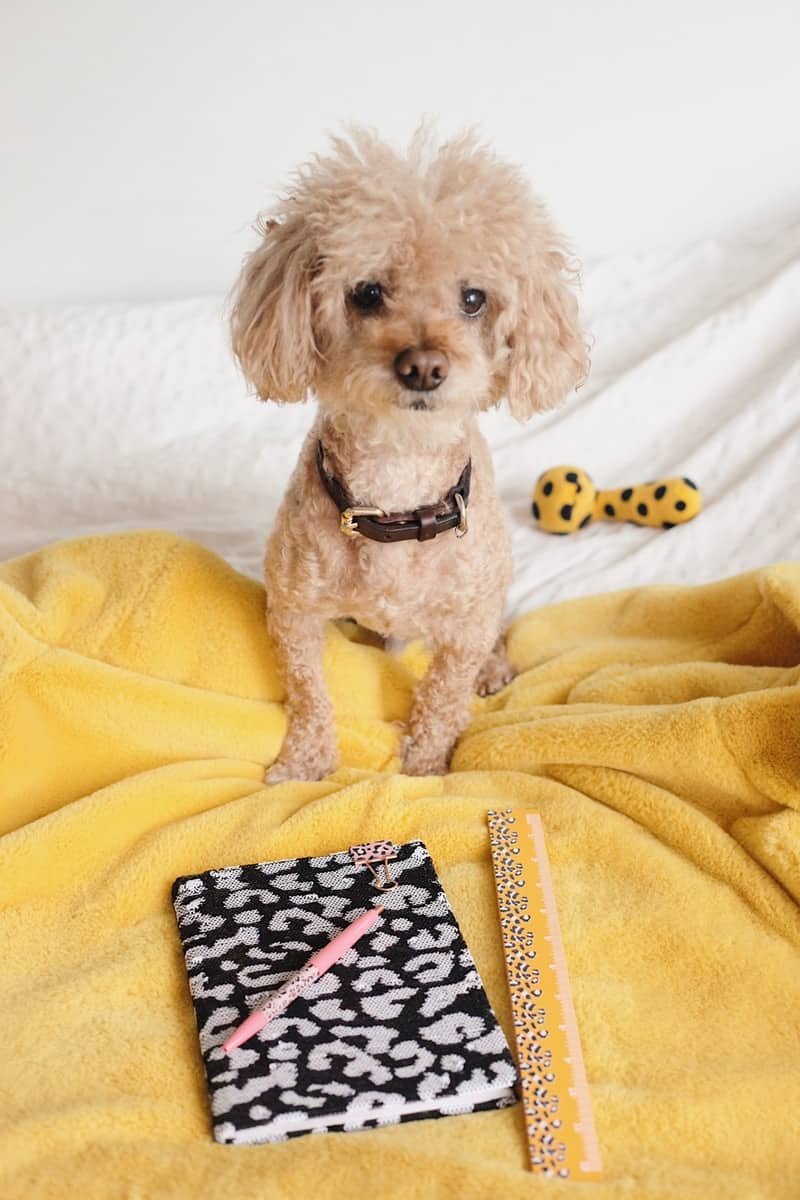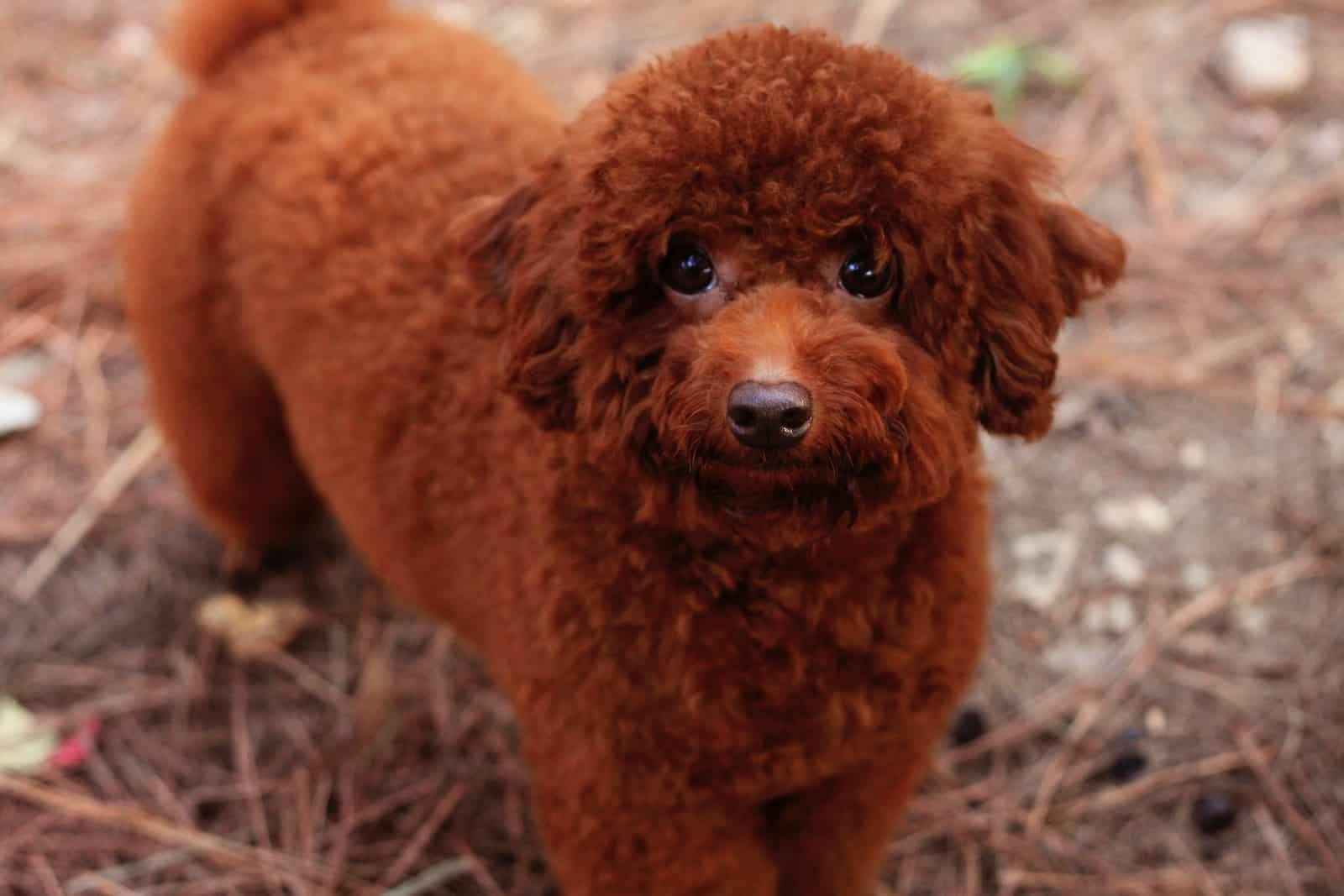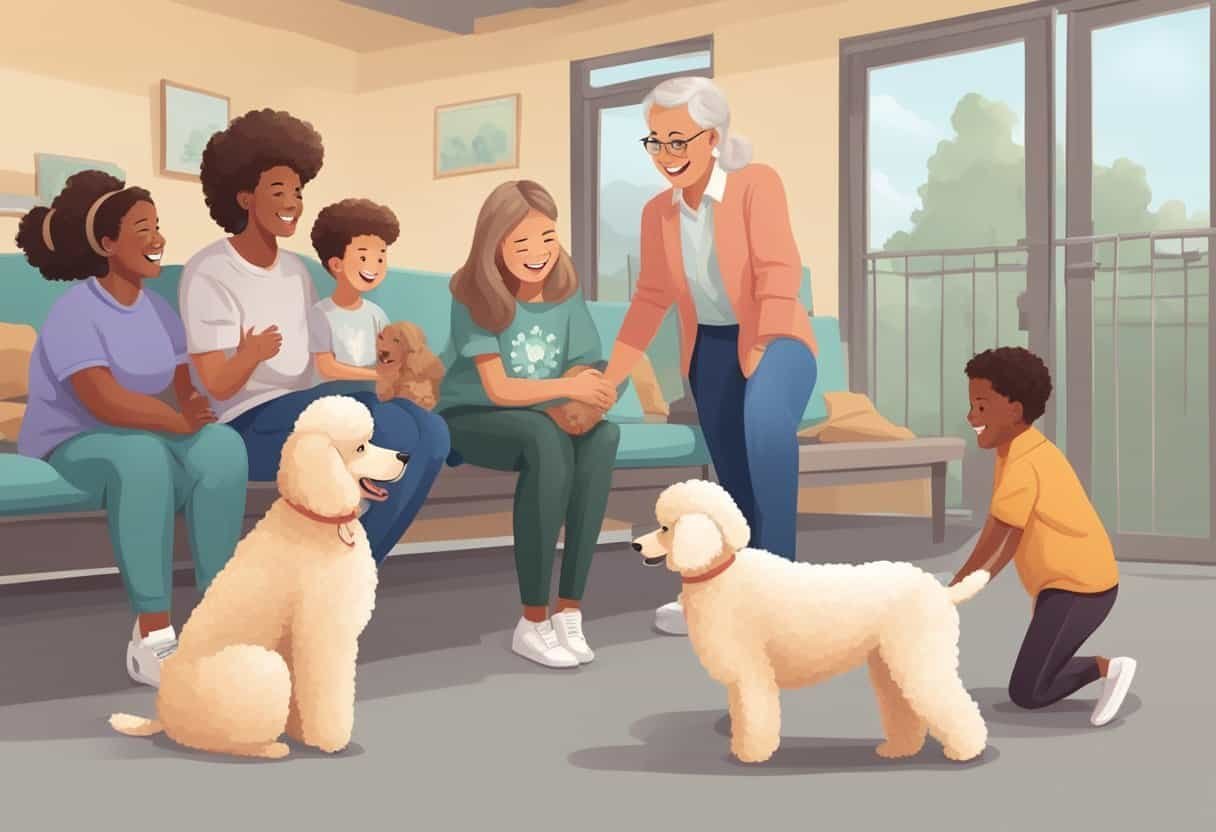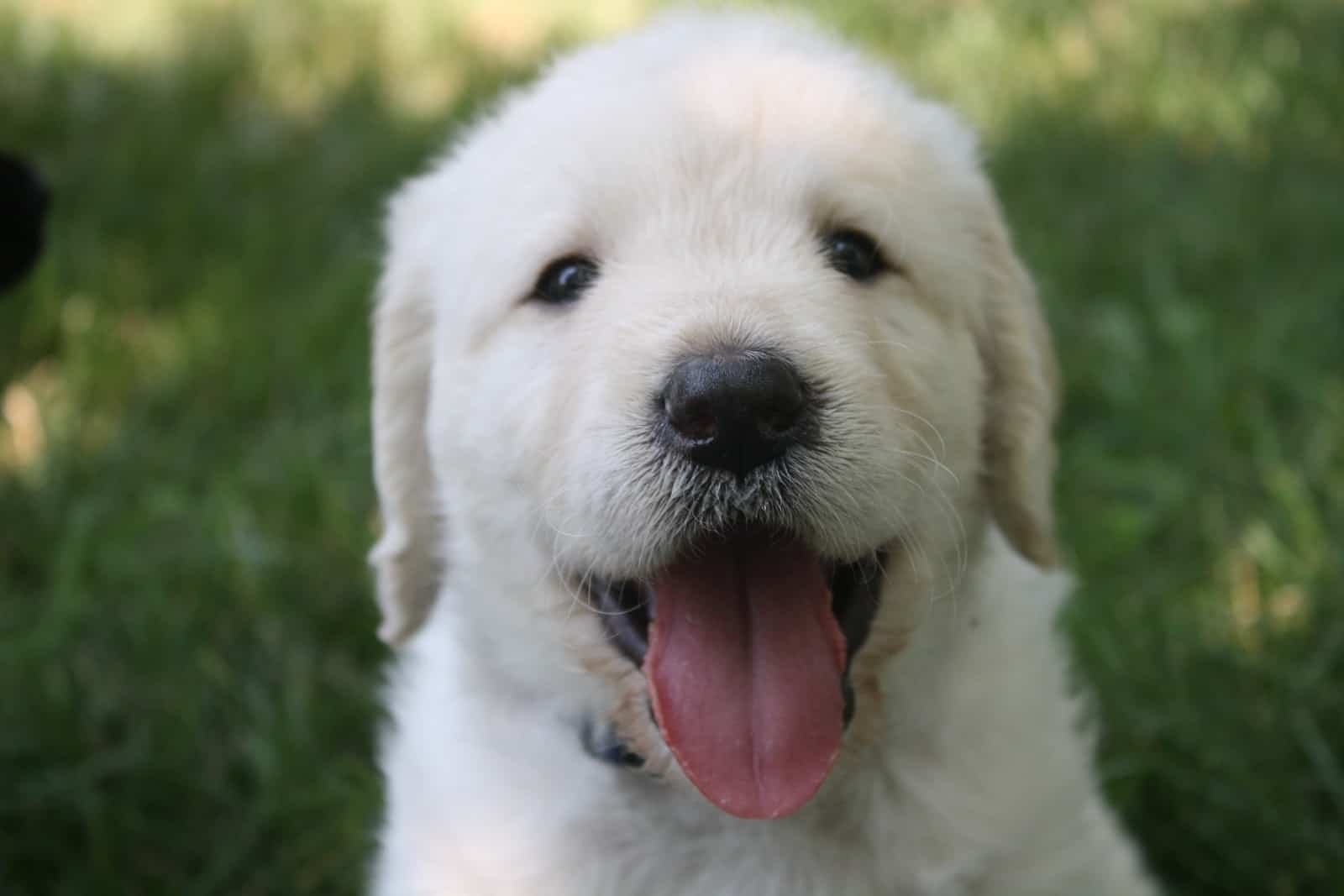

If you want that sweet spot between a Toy and Standard Poodle, then the Miniature Poodle is the optimum dog for you. Many purebred poodles have similar characteristics, though a few notable breed differences make them unique.
For those considering getting a Miniature Poodle puppy, here are all the things you need to know!
The Miniature Poodle History
Poodles originated in Germany, bred to work as waterfowl hunters. They originated in Germany, then later developed into a popular breed in France, where they became the country’s national dog.
Related Reading: Poodle Puppy Breed Guide – Choosing the Right Size
The Mini Poodle started with the Standard Poodle, though it was then bred down to a Miniature Poodle, as more people wanted a more manageable size pet. Mini Poodles worked to sniff out truffles instead of waterfowl because of their smaller size. They also became famous as a companion pet and lapdog.
The Mini Poodle falls under the three categories of the Poodle recognized by the American Kennel Club: Standard, Miniature, and Toy Poodles.
Miniatures (or Mini Poodle) fall in the middle, with Standard being the biggest and toy being the smallest. They grow to become around 10-15 inches tall, weighing 10-15 pounds. Similar to the other Poodles, a Mini Poodle has an athletic frame thanks to their origins as waterfowl hunters.
The Mini Poodle also has a wavy or curly coat, round dark eyes, and lively faces you’ll love! No matter the coat types, they come in various colors: brown, black, apricot, gray, silver, and even a white coat. The Poodle’s coat sheds minimally as they only have a single coat layer, so people with allergies can enjoy having a pet without risk of allergic reactions.
Temperament
When you compare the Miniature Poodle to the other breeds, they are also in the middle range of temperament. The Toy Poodle is a bit more hyper, while the Standard Poodle is the calmest. Again, you get the sweet spot with a Miniature Poodle, who loves to play around and appreciates quiet times with his owners.
One thing the Poodle types have in common is that they felt anxious and timid. That’s why they are best for households with peaceful living arrangements with a ton of loving attention.
Mini Poodles are intelligent and playful, loving to play just as much as puppies. Their activity levels dwindle a bit as they mature, but your Miniature Poodle will continue being active as an adult dog.
These Poodles can act as watchdogs, but they won’t be aggressive if they are properly socialized. When meeting someone new, the breed’s reaction can either be shy or friendly and polite. They may have a high barking level when feeling suspicious about new things or people!
Mini Poodles can get easily scared and anxious when separated from their owners. You will need to give your attention to your Poodles most times of the day and provide them a conflict-free environment. That means they won’t be suitable pets if they’re left alone and always out of the house!
Mini Poodles have excellent temperaments and fit in most households today. Miniature Poodles are highly sought after for their intelligence, adaptability, and people-oriented nature. As long as you take the time and effort to provide them with love, attention, and adequate care, they make excellent family pets. Before getting a Miniature Poodle puppy, find a reliable breeder who will provide important information about the puppy’s background and health. This will ensure that your new pet is healthy and happy.
Training and Exercise Needs
As mentioned, people bred Poodles to work, and the Miniature Poodle is no exception. Not only are they playful, but they have athletic bodies that move and require mental stimulation.
The Poodle appreciates bigger spaces for running and burning off his high energy level. If you live in a smaller house, that’s no problem. Just make sure that you take them out around the neighborhood or nearby dog park every day. Take them out for exercise and training for at least an hour a day!
I recommend playing a lot of fun games, besides walking or swimming in the pool. Poodles will appreciate mental stimulation through toys or games like fetch. You can also get them into other dog sports and games related to agility, retriever hunting, tracking, and even dock diving!
Fortunately, they play nicely with children and other pets, but their size and sensitivity may hurt them in the long run. Miniature poodles are best suited for homes with older kids to prevent being mishandled by curious toddlers.
Poodles are people pleasers. Combine that with their intelligence, and you get a dog that’s easy to train!
Make sure that you train your Poodle properly to prevent destructive behavior and poor manners. Start with crate training and house training, then move up to obedience training with basic commands. As they learn, you can teach them complex commands and take them with agility training.
If left untrained, they become spoiled and believe they are the alpha dog of the household. It can lead to bad manners and the belief they can get away with anything they do. They can also end up adopting a high-strung attitude.
You will need to have consistent training sessions, with brief sessions every day. That way, they learn and remember their lessons better, and they are less likely to feel exhausted or frustrated after long training sessions.
When training, keep it upbeat with a lot of positive reinforcement. Avoid shouting or punishment, as this would discourage your Poodle and result in an anxious pet!
Remember that the Poodle is sensitive and won’t respond well to harsh tones or training methods. If they are shouted at or punished, they will take it personally and feel hurt. As a result, they could lose their love and respect for you. You can find different training tips from dog obedience schools or training videos.
Coat Grooming Needs
We consider the Poodle’s coat is hypoallergenic. While it is not an entirely hypoallergenic coat, their hair and minimal shedding characteristics make people less likely to suffer from allergies.
When Poodles shed, every 21 days, their hair won’t fall to the floor. Instead, it gets trapped in its corded or curly coat, which can cause matting if left untreated. Matting isn’t only uncomfortable, but it causes skin irritation and tangling. That’s why you must brush your Poodle every day.
Poodle owners choose to give their dogs a shorter cut or trim, which minimizes the coat grooming needs. That way, you will only need to brush your Poodle every other day. But for owners who want to keep their dog’s coat length long, you’ll need to brush them daily and check their eyes and ears to ensure no infections or dirt come across.
If matting comes across, you will need to shave off your dog’s coat completely for hair growth to start all over.
As for complete grooming from baths to trims, it’s best to take them to a professional groomer, or do it yourself, every 4-6 weeks. Besides grooming the Miniature Poodle’s coat, trim their nails monthly. It would be best if you cleaned their eyes and ears and cut the hair around those areas to prevent infections from dust, dirt, and moisture build-up.
Health
Miniature Poodles would live between 10-18 years and live a healthy life. Responsible breeders will routinely test their parents’ dogs and puppies for any health conditions they are prone to.
Mini Poodles are prone to the following health concerns:
- Eye problems: Miniature Poodle puppies are incredibly adorable, however they can also be prone to eye problems such as Progressive Retinal Atrophy (PRA), cataracts and glaucoma. PRA is an inherited disease where the rod cells in the eyes slowly degenerate over time, leading to blindness. It typically starts showing symptoms between two and five months old and can progress quickly. Diagnosis of PRA is done with an eye examination, genetic testing, and electroretinography. If a potential puppy has been tested for PRA then the results should be made available to you prior to buying. Cataracts can also occur in Miniature Poodles and often cause problems with their vision. Glaucoma is another disease that can affect the eyes of Miniature Poodles and can cause blindness if left untreated. When looking for a Miniature Poodle puppy, find a reputable breeder who provides health clearances for the parent dogs. This will help ensure that you are getting a healthy puppy that has been bred responsibly and ethically.
- Ear infections: Miniature Poodle puppies are susceptible to ear infections. The most common cause of ear infections in dogs is bacteria or yeast. It’s important to check your pup’s ears regularly, especially if they have long floppy ears like a Miniature Poodle. If you notice any redness, swelling, discharge, or an odor coming from the ear then it is likely that your pup has an infection and should be taken to the vet for treatment. In addition, it is important to keep your Miniature Poodle’s ears clean by wiping them out with a damp cloth weekly. You can also use an ear cleaner specifically designed for dogs to help keep their ears free of wax and debris.
- Skin allergies: Miniature Poodles are prone to skin allergies that can lead to itching, redness, and hair loss. Common allergens that can cause skin allergies in dogs include flea bites, food allergies, and environmental allergens such as pollens, molds, and dust mites. If your Miniature Poodle has any symptoms of a skin allergy, then it is important to take them to the vet for diagnosis and treatment. Treatment typically includes medications such as antihistamines , shampoos, and other products to help ease the symptoms.
- Epilepsy is a neurological disorder that affects about 1% of dogs, especially miniature poodle puppies. This condition can cause seizures that range from mild to severe and can be triggered by anything from a stressful situation to an injury or even genetics. Epilepsy can be diagnosed through lab tests, neurological exams, and imaging tests. Treatment varies and may include medications, dietary changes, and physical or mental stimulation. It is important to monitor your pup closely if they are diagnosed with epilepsy and to take them to the vet for regular check-ups.
- Tracheal Collapse: a condition that can affect miniature poodle puppies. This condition causes the trachea (windpipe) to narrow or flatten. It can lead to difficulty breathing, coughing, gagging and other signs of distress. The cause of this condition is not completely understood, but certain breeds are more prone to developing it than others. Though tracheal collapse can be treated, if left untreated, it can be fatal. Treatment typically involves medications such as anti-inflammatories and bronchodilators as well as lifestyle modifications, such as avoiding physical activity or exposure to cold temperatures. Surgery is also an option for more severe cases. It is important to take your pup to the vet if you suspect they have this condition, so that a proper diagnosis and treatment plan can be made. In addition to medical treatments, there are also lifestyle changes that you can make to help your pup manage their tracheal collapse. Keeping them at a healthy weight and avoiding activities that could cause further collapse of the trachea is important. Additionally, reducing environmental irritants such as smoke or strong odors can help reduce symptoms of the condition.
- Von Willebrand’s Disease: an inherited bleeding disorder in dogs, including miniature poodle puppies. It is caused by a deficiency of von Willebrand factor, which helps maintain proper blood clotting. Symptoms of Von Willebrand’s Disease can include excessive bleeding from minor cuts or injuries, nosebleeds, blood in the urine or stool, and poor clotting when the puppy is spayed or neutered. Treatment often involves medications such as desmopressin and aminocaproic acid, as well as lifestyle modifications such as avoiding certain activities that could lead to injury or excessive bleeding. It is important to take your puppy to the vet if you suspect they have this condition so that a proper diagnosis and treatment plan can be made.
- Patellar Luxation: an orthapeidc condition that can affect miniature poodle puppies. This condition causes the knee to slip out of its socket, resulting in discomfort or lameness. It can be caused by genetics, trauma or conformation defects, and it is more common in small breeds like the miniature poodle. Treatment usually involves medications to reduce inflammation and pain, as well as surgery to realign the bones. Physical therapy and exercise can also help strengthen muscles around the affected joint. It is important to take your puppy to the vet if you suspect they have this condition so that a proper diagnosis and treatment plan can be made.
- Hip dysplasia: a common health concern for miniature poodle puppies, and it is an inherited condition that affects the hip joints. It typically occurs when the hip joint does not develop properly and can range from mild to severe cases. Symptoms of hip dysplasia include limping, difficulty rising or jumping, pain in the hind legs, stiffness in the hind legs, or decreased range of motion. Treatment can range from exercise and physical therapy to medications or even surgery, depending on the severity of the condition. It is important to take your puppy to the vet if you suspect they have this condition so that a proper diagnosis and treatment plan can be made.
- Dental Diseases: tartar buildup is a common dental disease in miniature poodle puppies. As the bacteria in their mouths begins to form plaque, this can quickly develop into tartar if left untreated. Tartar buildup can lead to gum infections and tooth decay, which can cause discomfort and pain for your puppy. To help prevent tartar buildup, it is important that you brush your miniature poodle puppy’s teeth regularly and feed them a balanced diet. If tartar buildup does occur, your vet can perform a dental cleaning to remove the buildup and help keep their teeth and gums healthy.
Because of this, you must take your Miniature Poodle to the veterinarian for routine check-ups and keep his vaccinations up to date. He should also have regular teeth cleanings, whether at home or the vet. That way, you can prevent any medical issues and diagnose conditions to treat it early on before it worsens.
It’s also best to ask the breeder for a health certificate or any health clearances of the parent breed and puppy.
As for their dietary needs, they have no specific issues. Aim to incorporate a healthy diet with high-quality dog food and plenty of fresh water nearby. You can also give treats now and then, but don’t overdo it, or it may lead to unhealthy weight gain.
Obesity can be an issue among all dog breeds, including Poodles. Avoid overfeeding them, which can put your dogs at risk of heart diseases and other severe medical conditions. Food poisoning may also occur if fed human food, so never feed them off your table! Not only does this keep them healthy, but it prevents them from adopting bad manners, such as begging during mealtimes.
There are different types of dog food based on age, activity level, and certain medical conditions, so it’s best to consult your veterinarian. He can recommend a reputable brand and type of dog food to meet your Poodle’s specific nutritional needs.
Who is the Miniature Poodle Best for?
Many Miniature Poodle owners agree that this popular dog breed is brilliant, hassle-free to train, and has a lot of love to give. They are people-oriented and quite sensitive to the moods and tones of voices of those around them. Because of that, they are an excellent fit for new or experienced dog owners.
Mini Poodles are highly adaptable and can do well in most homes, big or small. They fit into most family types, whether you’re living independently, with your partner, or have a big family with children. However, they do best with older children than toddlers, so it’s best to wait for your children to grow older and learn how to handle animals before getting a Miniature Poodle.
This dog breed adapts well to a wide variety of climates. But like other dog breeds, they become sensitive to extreme hot or cold weather.
If you are a family with older children and adults, and you are ready to take the time and effort to care for a dog that requires attention, then the Miniature Poodle is best for you. They are also an excellent choice for allergy sufferers and new dog owners who want a smaller breed in their apartments.
However, if you are always out and have no time for daily training and grooming, you may prefer a dog breed that is comfortable being alone for long periods.
Like owning other dog breeds, you have to make a lifelong commitment to your new Miniature Poodle. They will require more grooming and attention, and as long as you’re willing to meet their care requirements, you will enjoy your companion, and they will feel the same way.
Where to Get Miniature Poodle Puppies?
Do you believe that the Miniature Poodle puppy is a suitable pet for you? There are various ways you can get one!
For starters, you can adopt one from your local animal shelters or rescue groups. That said, it’s less likely for you to find Miniature Poodle puppies but more on adult dogs.
If that is fine, you can prevent a few negative traits and know what to expect from an adult dog. Plus, you get to give a lovely dog a new, better life.
If not, you can find Miniature Poodle puppies for sale from responsible breeders. Make sure that you choose USDA licensed and reputable breeders and are reputable from your National Kennel Club. The American Kennel Club has a directory available for you to narrow down your choices on Miniature Poodle breeders.
You’ll need to be wary of the price and prepare for the upfront and future ongoing expenses of raising a Miniature Poodle puppy. They can cost anywhere between $1,200 to $5,000, sometimes more. The costs vary from breeder to breeder, and the high price comes from the high breeding costs and health screening, among other factors.
It’s better to purchase a healthy Miniature Poodle puppy from a reputable family-owned breeder who cares for his animals well, though. Even if it’s pricier, it is better than getting puppies from a sketchy commercial breeder who treats their dogs poorly, which is not only unethical but places many health risks on the puppies.

